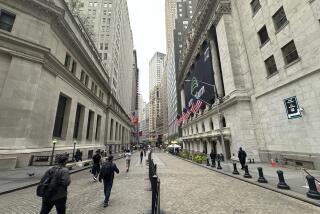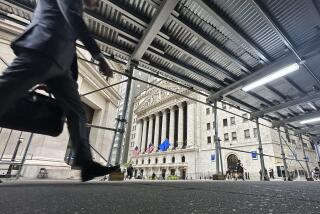Stocks fall globally on Greek crisis
After largely ignoring a recent escalation of Greeceâs debt crisis, the U.S. stock market tumbled Tuesday in a global sell-off caused largely by Europeâs fiscal woes.
The Dow Jones industrials dropped 225 points.
Investors worried that a $146-billion bailout for Greece wouldnât stop the crisis from engulfing Spain, Portugal and other European countries, destabilizing their economies and restraining the global economic rebound.
âThe concern is that Greece is just the beginning,â said David Dietze at Point View Financial Services in Summit, N.J. âThat was just the first cockroach, but we all know there is always more than one cockroach.â
Investors also were unnerved by fear of a potential slowdown in China, as a report suggesting a weakening factory sector followed news of the Beijing governmentâs latest effort to cool the countryâs surging growth.
The twin developments overseas outweighed encouraging economic data in the U.S., where home sales climbed 5.3% in March and factory orders climbed the most in 2 1/2 years.
The Dow fell 225.06 points, or 2%, to 10,926.77, while the Standard & Poorâs 500 index slumped 2.4%. The Nasdaq composite index, many of whose technology companies rely on sales abroad, sank 3%.
The declines left the three major U.S. indexes at their lowest levels in about a month.
Losses were steeper closer to the crisis. Key indexes plunged 7.4% in Greece, 5.4% in Spain and 4.7% in Italy.
The euro slumped to a one-year low against the dollar, ending New York trading at $1.30. It had topped $1.50 in November.
Although the Greek crisis sent U.S. stocks down sharply early in the year, they rebounded impressively on a stream of signs of an improving domestic economy.
Even as worries about Greece grew in the last three weeks and European shares lost ground, major U.S. stock indexes held steady, seemingly immune to the predicament overseas. But that immunity vanished Tuesday as investors looked closely at the rescue package cobbled together by the European Union and the International Monetary Fund to keep the Greek government from defaulting on its debt.
âMarkets have given a clear âthumbs downâ to the Greek aid package,â said Win Thin, a currency strategist at Brown Bros. Harriman & Co. in New York.
One concern is about Greeceâs willingness to implement the severe austerity measures required by the plan.
And if the crisis spreads to countries such as Spain and Portugal, investors fear, politicians wonât be able to muster the financial wherewithal -- or the political will -- to help those countries.
Such worries increased after Chancellor Angela Merkel of Germany, where the aid to Greece is enormously unpopular, called for a process of âorderly insolvencyâ for governments that canât pay their debts.
Yields of European government bonds surged as investors fretted about the risk of default. Meanwhile, U.S. Treasury bonds rallied, pushing their yields down, as investors sought out perceived havens. The benchmark 10-year Treasury note fell to 3.61% from 3.7% on Monday.
A report showing the slowest manufacturing growth in China in six months also spooked investors, who are counting on fast growth in emerging markets to offset the economic lethargy of developed nations.
âThis manufacturing report could be the beginning of a disappointment for China,â said Jack Ablin, chief investment officer of Harris Private Bank in Chicago.
Shanghaiâs stock market lost 1.2% on Tuesday.
--
Times staff writer Tom Petruno contributed to this report.
More to Read
Inside the business of entertainment
The Wide Shot brings you news, analysis and insights on everything from streaming wars to production â and what it all means for the future.
You may occasionally receive promotional content from the Los Angeles Times.










